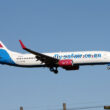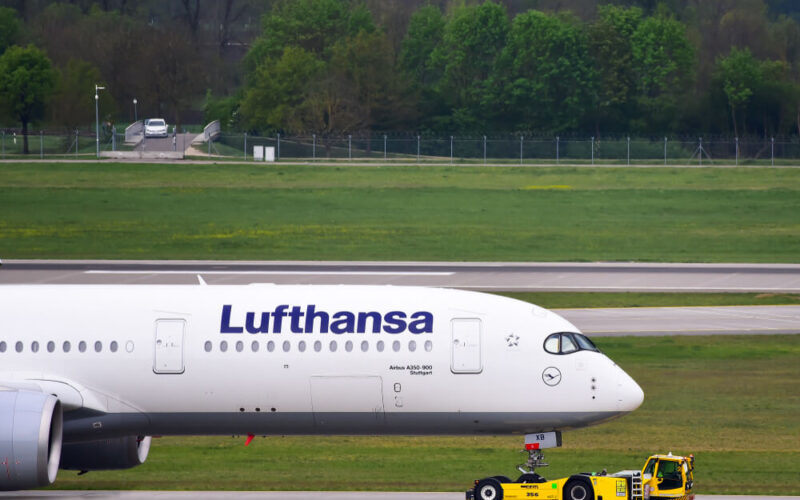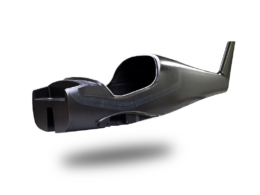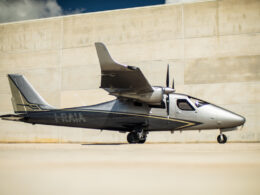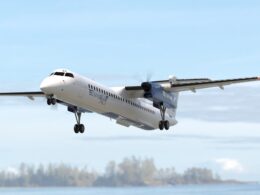The German airline group, consisting of Air Dolomiti, Austrian Airlines, Brussels Airlines, Eurowings, Lufthansa (LHAB) (LHA) and Swiss International Air Lines, is facing a challenging operating period. With a reported fall in profits in 2019, the recent coronavirus outbreak will cause a further drop in earnings, stated the airline‘s yearly report.
The COVID-19 outbreak cut the ground from Lufthansa’s (LHAB) (LHA) feet: the airline group was forced to ground around 700 of its 763 aircraft and several airlines within the group suspended operations completely. Air Dolomiti and Austrian Airlines’ fleets are grounded indefinitely and until March 28, 2020, respectively, while Brussels Airlines will not operate any regular flights starting March 21 until April 19, 2020.
Low pass over Frankfurt Airport. Many parked planes on the taxiway. pic.twitter.com/KjGQnjVsyd
— Swiss001 (@Swiss001yt) March 16, 2020
Furthermore, one of Lufthansa (LHAB) (LHA) ‘s main hubs, Munich Airport (MUC), will only be served by Lufthansa CityLine – the regional subsidiary of the main airline in the group. Within the group itself, long-haul destinations will only depart from Frankfurt Airport (FRA) and Zurich Airport (ZRH), while only a select few European destinations will be operated from hubs in FRA, MUC and ZRH.
All the changes taken into account, Lufthansa’s (LHAB) (LHA) perspectives look like a flashback from the past. “The flight schedule from 1955 looked exactly like the one we will fly next week,” said Carsten Spohr, Chairman of the Executive Board of Lufthansa (LHAB) (LHA) during a press conference, explaining that the airline’s flight schedule would fall back to two-digit numbers.
To secure the financial stability of the company going forward, Lufthansa (LHAB) (LHA) raised around $645 million (€600 million) of additional funds. In total, the German airline group has liquidity of around $4.6 billion (€4.3 billion euro), with unused credit lines amounting to $860 million (€800 million). Lufthansa (LHAB) (LHA) plans to raise further funds, with aircraft financing as one of the options, potentially indicating that it will use the sale-leaseback option on its fleet of aircraft.
The airline owns 86% of its fleet, with 14% of its aircraft leased. Carsten Spohr noted that the aircraft that Lufthansa (LHAB) (LHA) owns has a book value of around $10.7 billion (€10 billion).
Difficult operating environment leading to falling profits
The operating result for 2019, while in line with Lufthansa’s (LHAB) (LHA) forecast, was 29% lower than in 2018: the group finished the year with an Adjusted EBIT of $2.1 billion (€2 billion). Worryingly, revenues from its operations only rose by 2% year-on-year, going from $38 billion (€35.5 billion) in 2018 to $39.1 billion (€36.4 billion), while operating expenses grew by 6% to $40 billion (€37.3 billion), with the main driver of the rise in expenses being fuel. The airline group spent more than $645 million (€600 million) more on fuel than compared to the previous year.
In total, the group transferred 145.1 million passengers (+2%), on 1.1 million flights throughout the year with an average load factor of 82.5%.
Lufthansa (LHAB) (LHA) argues that the drop in margins is due to a difficult operating environment, including price erosion arising from overcapacity in Europe, a general economic downturn in the airline’s home markets and hedging-related higher fuel and MRO costs. Nevertheless, Lufthansa (LHAB) (LHA) has been on a hunt to minimize its operating costs, including turnaround plans at Austrian Airlines, Brussels Airlines and Eurowings.
Grim prospects
However, the outlook doesn’t look too good. Due to limited capacity in the group’s main hub airports with bottlenecks in airport infrastructure and air traffic control limit the group’s ability to grow organically and instead rely on profitability growth. Additionally, Lufthansa (LHAB) (LHA) , like many others, is facing one of the biggest crises in the history of aviation with COVID-19 crippling the global economy and in turn, the travel industry.
While it cannot provide a concrete profit guidance, the group highlighted that the outbreak will have a significant impact on earnings, despite implemented cost-cutting measures, including a 70% capacity cut that started from March 13, 2020.
Furthermore, Lufthansa (LHAB) (LHA) is amidst a fleet modernization and standardization process. While in doing so it would reduce costs, the timing is very off, as Carsten Spohr highlighted. The airline had previously planned to take in a new aircraft every 10 days in 2020.
“Right now, we need none,” Spohr stated. The airline is negotiating to defer deliveries from both Airbus and Boeing.
In total, Lufthansa (LHAB) (LHA) has 198 aircraft on order, with 102 additional options. Amongst the aircraft ordered, the airline is renewing its short-haul fleet with Airbus A220 and A320 family aircraft, while it will get a variety of wide-bodies delivered, including such aircraft as the Airbus A350, Boeing 787 and the yet-certified Boeing 777X.




